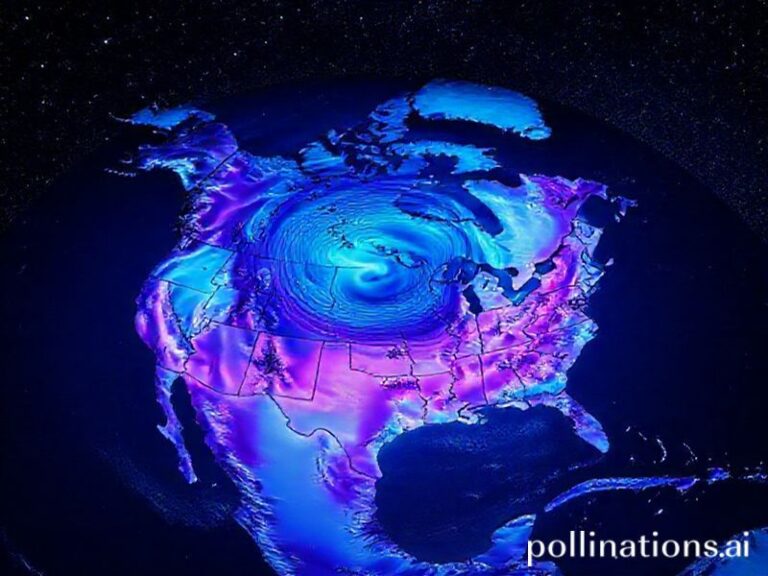내일 날씨 Goes Global: How Tomorrow’s Forecast Became the Planet’s Shared Mood Ring
Tomorrow’s Weather: A Global Forecast of Mild Panic and Strategic Umbrella Deployment
By Our Correspondent Who Has Already Lost Three Brollies to the Gods of Irony
SEOUL—Across the planet, the phrase “내일 날씨” (“naeil nalssi” – tomorrow’s weather) is being whispered, Googled, or barked at smart speakers in 167 languages. It sounds benign, like asking your grandmother for a cookie recipe, but behind the query lurks humanity’s perennial hope that the sky will not, in fact, fall on our heads. From Lagos to Ljubljana, we are all united by the same existential roulette: dress for drought, get flash-flooded; pack a parka, watch the sun roast your optimism like a cheap kebab.
In the grand casino of climate, South Korea’s Meteorological Administration is the croupier tonight. Their forecast: Seoul, 24 °C, “passing clouds.” Translation: the peninsula will enjoy a balmy reprieve before next week’s monsoonal revenge, when the Han River reclaims the bike lanes and politicians discover the word “resilience” all over again. Meanwhile, 1,000 km west, Beijing’s air-quality index is already the color of a smoker’s lung, and Delhi’s thermometer is flirting with 46 °C—hot enough to fry a philosophical egg on the hood of an Uber. The same jet stream that gifts Koreans a polite Tuesday breeze is currently transporting Rajasthani dust toward the Pacific like an Amazon Prime package nobody ordered.
Zoom out. Over the Atlantic, the National Hurricane Center is tracking a tropical depression that could mature into “Cyclone Dystopia” just in time for July 4th barbecues. Insurance adjusters in Miami-Dade have popped their first antacid of the season. Under the Sahara, Sudan’s rainy season is expected to dump 200 mm in 48 hours—great for millet, less so for the 850,000 displaced souls camping in tarp cities that billow like failed soufflés. And in Antarctica, a berg the size of Mallorca just calved from the Brunt Ice Shelf; scientists call it “calving,” as if the planet were gently giving birth rather than dropping an ice cube the size of a Mediterranean vacation into a steadily warming gin and tonic.
The economic implications are as cheerful as a tax audit. The EU estimates that weather-related disasters now cost the bloc €12 billion annually—roughly the GDP of Malta, sacrificed each year to the thunder gods for the crime of building beach resorts on floodplains. In India, heat-wave days have doubled since 1971, shaving 3% off labor productivity, which translates to 1.5 million full-time jobs lost to sweaty despair. Even Silicon Valley’s hoodie-clad optimists are quietly hedging: Google’s newest cloud-computing center in Nebraska is elevated six meters above the hundred-year flood line, a bet that “hundred-year” now means “every other Tuesday.”
Back at street level, the humble umbrella has become the urbanite’s Swiss-army knife—sunshade, protest placard, and occasional lightning rod. Tokyo’s department stores report a 40% spike in “UV parasols” sold to office gentlemen who’ve discovered that melanoma is gender-neutral. Meanwhile, Londoners still refuse to carry one, preferring the national pastime of damp stoicism. (“Mustn’t grumble; the Blitz was worse.”) Their mayor has just unveiled a £1.6 billion “sponge city” plan—essentially converting pavements into giant Nespresso pods that absorb rain and release it during the next hosepipe ban. Expect graffiti within weeks reading “This Puddle Is a Metaphor.”
And yet, despite satellites crammed with enough sensors to make a KGB alum blush, tomorrow remains stubbornly uncertain. The European Centre’s supercomputer—nicknamed “Icarus” by staff who enjoy poetic unemployment—processes 300 trillion calculations per second, only to deliver a probability cone that looks like a drunk frat boy’s dart throw. Meteorologists call it “skill”; everyone else calls it “slightly better than flipping a coin.” Still, we refresh the app at 2 a.m., hoping the pixelated cloud icon will magically turn into a sun wearing sunglasses. Spoiler: it won’t. The cloud is us, frantically uploading selfies while the planet runs a fever.
So, wherever you wake up—Seoul, São Paulo, or Schenectady—pack humility alongside your reusable water bottle. The atmosphere is the last truly borderless regime, and it’s issuing visas to nobody. Dress in layers, charge your phone, and remember: the forecast is partly cloudy with a 100% chance of existential subtext. Carry an umbrella, or don’t. Either way, the sky remembers everything.







